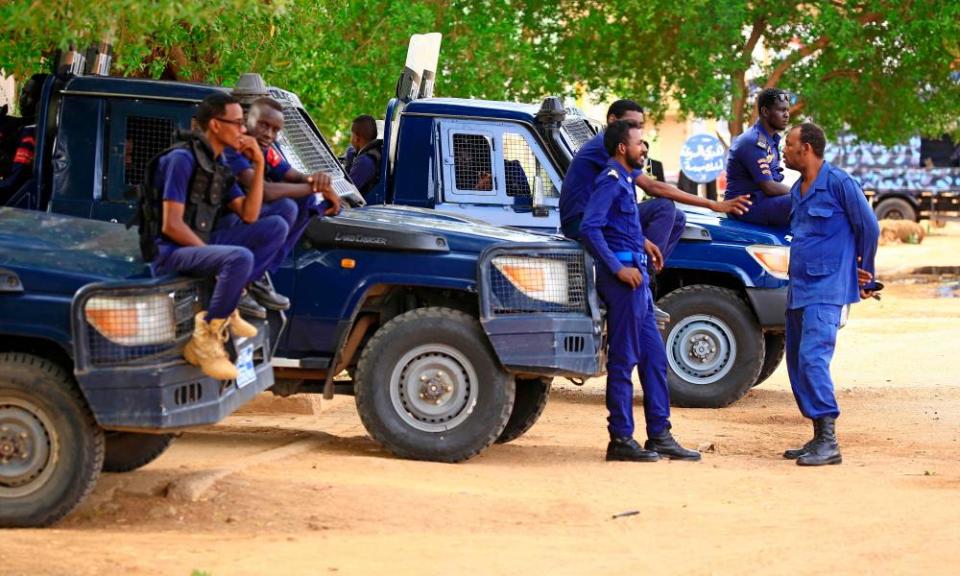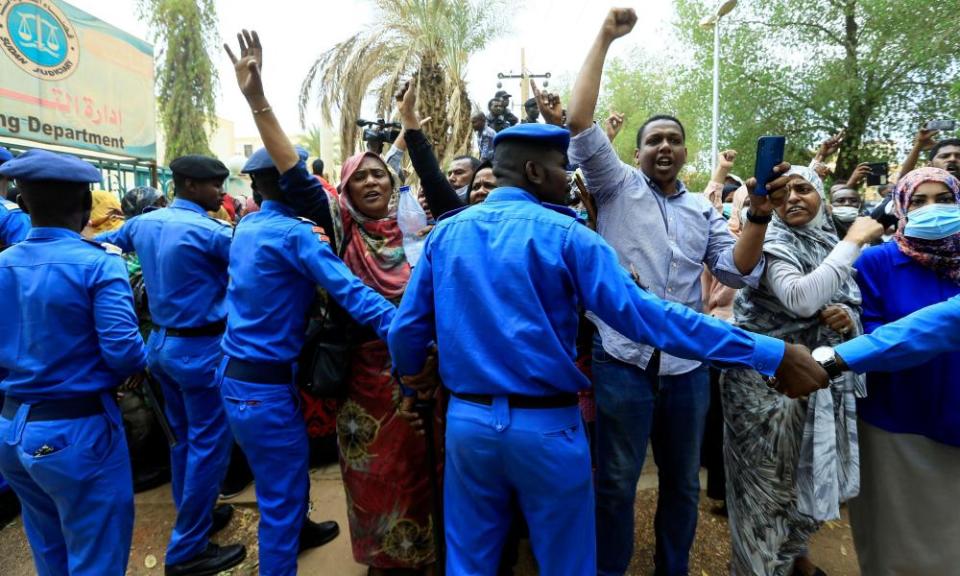Sudan's ex-strongman on trial over coup that brought him to power

Omar al-Bashir, the authoritarian former ruler of Sudan ousted amid a popular pro-democracy uprising last year, has gone on trial in Khartoum on charges of orchestrating the military coup that brought him to power more than three decades ago.
The trial of Bashir, who has been held in detention since being convicted of money laundering and corruption in December, comes at a time of massive change in the country of more than 40 million people.
Bashir is in the dock with 10 military personnel and six civilians, including two former vice-presidents, ex-ministers and governors. The 76-year-old could face the death penalty if convicted.
All are accused of having plotted the coup on 30 June 1989, when the army arrested Sudan’s democratically elected political leaders, suspended parliament and other state bodies, closed the airport and announced the takeover on the radio.
Bashir stayed in power for 30 years before being overthrown on 11 April last year after several months of unprecedented street demonstrations.
(January 1, 1944)
Bashir is born to a rural family in the village of Hosh Bannaga, 100 kilometres (60 miles) north of the capital Khartoum.
(October 6, 1973)
A soldier from a young age, he fought alongside the Egyptian army in the short 1973 Arab-Israeli war.
(June 30, 1989)
As brigade commander and with the backing of Islamists, he seizes power in a coup against the democratically elected Sudanese government.
(February 1, 2003)
He sends troops and militiamen to crush a rebellion in the western region of Darfur. The conflict claims more than 300,000 lives, according to the UN.
(March 4, 2009)
The International Criminal Court issues a warrant for Bashir's arrest on war crimes and crimes against humanity in Darfur. The following year it issues a warrant for genocide. He denies the charges.
(April 26, 2010)
He is elected president in the first multi-party election since he took power, which is boycotted by the opposition. He is re-elected in 2015.
(July 9, 2011)
After a referendum, South Sudan splits from Bashir's Sudan and becomes an independent nation.
(September 30, 2013)
Demonstrations against his government erupt after a hike in petrol prices. Officials say dozens are killed in related violence.
(December 25, 2018)
Protests begin in several towns after bread prices triple, snowballing into rolling nationwide rallies demanding he step down.
(April 11, 2019)
Bashir is removed from office by the military and detained.
The consequences of his dramatic fall were underlined this year when Sudan’s new government pledged to hand him over to the international criminal court (ICC) to face trial on war crimes and genocide charges related to the Darfur conflict, which left 300,000 people dead and millions displaced in a scorched earth campaign against a 2003 insurgency. .
There are few example of leaders on the continent who came to power through violence facing legal process after their deposition – though some argue that the real mastermind of the coup was the Islamist ideologue Hassan al-Turabi, who died in 2016.
“This trial will be a warning to anyone who tries to destroy the constitutional system. This will safeguard Sudanese democracy. In this way we hope to bring an end to the era of putsches in Sudan,” said Moaz Hadra, one of the lawyers who led the push to bring the case to court.
Hadra told Agence France-Presse that the accused was charged with offences including under chapter 96 of the 1983 penal code, which had been abolished by Bashir and which carries the death penalty for attempting to destroy the constitutional order.

Sudan has had three coups d’etat since gaining independence from Britain in 1956.
Defence lawyers said Bashir and the others would face “a political trial” held “in a hostile environment on the part of the judicial system against the defendants”.
“This trial is aimed at the Islamic movement and its sole purpose is to present it as a terrorist movement, but we have prepared our defence and we will prove the contrary,” said Hashem al-Gali, one of the accused’s 150-strong legal team.
Gali argued that the events of 1989 were beyond the statute of limitations and should therefore no longer be dealt with by a court.

Hundreds of Bashir’s supporters gathered outside the court in Khartoum on Tuesday, shouting religious slogans and calling the former dictator “the lion of Africa”.
He entered the courtroom wearing white traditional clothes and a face mask, greeting supporters with a raised hand.
Proceedings were adjourned until 11 August for a review of social distancing and other hygiene measures, local TV networks reported.
The transitional government that took over after Bashir was toppled has faced stiff opposition from conservatives who thrived under the former regime, and there were protests when the new prime minister, Abdalla Hamdok, recently announced a raft of reforms.
These included a ban on female genital mutilation, the cancellation of prohibitions against religious conversion from Islam and permission for non-Muslims to consume alcohol.
Sudan will also ban the practice of takfir, by which a Muslim can be declared apostate by another and therefore subject to a potential death sentence.
Hamdok, who leads an administration of technocrats under an awkward, 39-month power-sharing agreement between the military and civilian groups, described “accelerated economic and social changes”.
Together, the measures signalled a decisive break with almost four decades of hardline policies under the former regime and its Islamist backers.
Sudan is facing acute economic problems, and hopes to soon be taken off the US state department’s list of countries that sponsor terrorism, a significant hurdle to receiving foreign aid and investment.

 Yahoo News
Yahoo News 
